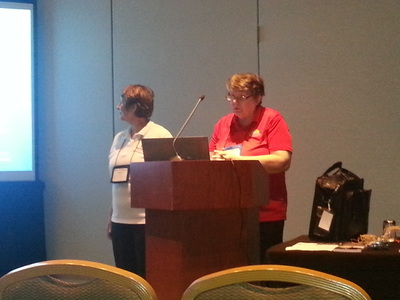 Debbie Carr, a national educator for Pet Partners and the Executive Director of Therapy Animals of Utah, and I, a special educator at ScenicView Academy, went to the international LDA Conference in Orlando, Florida, primarily to present our work in 4 different areas in partnering nationally registered therapy animals to facilitate emotional regulation, social responsiveness, and personal responsibility. Prior to the session, Debbie had called for two national registered Pet Partner teams to be at our session. Mayhem and Dudley came. The attendees learned why we chose Pet Partner animal/handler teams to work with at ScenicView. It was an aha moment for the attendees to learn why we developed our curricula, how we developed it, and what we are doing to monitoring and measure student progress. Our presentation promoted new, innovative ideas in successfully working with post-secondary students with autism and learning disabilities who are transitioning into society. The presentation was well-received. Our topic: How therapy animals can facilitate employability skills in working with students with autism and learning disabilities.
0 Comments
 Written by Whitney Clayton, Case Management Intern During our coaching session, I could tell that my student was getting a little overwhelmed with the topic we were discussing and started to feel bad about himself. I grabbed the Empowerment statement card and told him to read them out loud to me.  Written by Jared Stewart, Education Unit Manager ScenicView's annual Black History Month celebration has passed, but we'd like to thank everyone who helped make it a huge success! This year, the focus of the weekly assemblies was on SVA's Empowerment Statements. Emily Uasila'a shared poetry and points from the life of Pulitzer Prize winner Maya Angelou, who taught us to "find joy in the journey", and showed that "I am worthy of respect and connection".  Written by Stephanie Waters, Budgeting Specialist I have been working with a student on spending less money on junk food these last couple of weeks. She gets $20 a week to use for her pleasure, whether it be movies, food, etc. She calls it her fun money. She has a desire to learn to save more and spend better. When she received her fun money last week, she chose to pay 3/4 of it towards tithing, and the rest she used for fun. She felt that paying her tithing was more important than anything she could spend her money on. |
Archives
August 2018
Categories
All
|
Accreditation & Associations |
Awards |
CONNECT with USScenicView Academy © 2019
|
Contact Us
Hours of Operation Front Desk Hours: M-Th: 9 AM - 5 PM Fri: 9 AM - 3 PM Phone: (801) 226-2550 Toll Free: 866-723-6420 Fax: 801-226-8298 Email: [email protected] Tours by Appointment Only Find US
ScenicView Academy
5455 N. River Run Drive Provo, UT 84604 Below is a map from SLC International Airport to ScenicView Academy
OldApp |




 RSS Feed
RSS Feed







